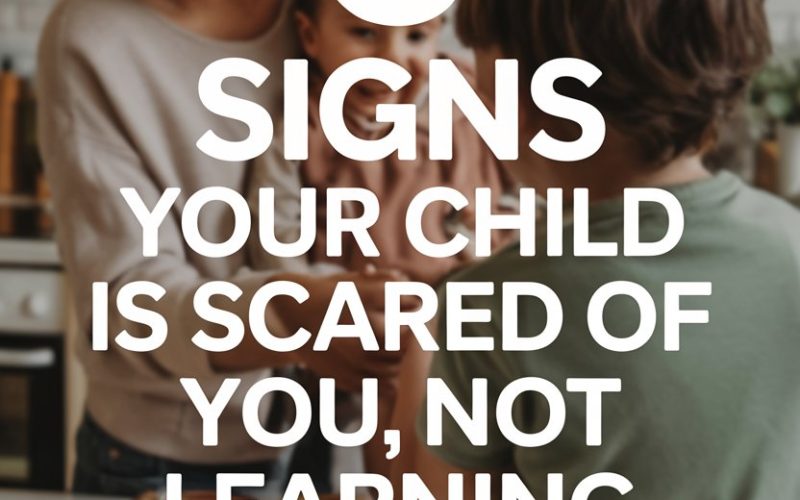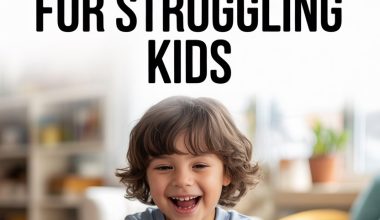Ever had that sinking suspicion your child’s quietness isn’t just “good manners”? Or that their eyes dart away when you walk in the room, like you’re wielding a tax audit instead of a bedtime story? You’re not alone.
Many loving parents find themselves wondering: Is my child actually scared of me—and missing out on real learning because of it?
Here’s the hard truth: Fear shuts down curiosity faster than an unplugged Wi-Fi router.
When a child’s main concern is avoiding your wrath, their brain isn’t focusing on multiplication tables or the joys of reading. It’s in “duck and cover” mode.
Busy parents don’t have time to decode every pout and eye roll, so let’s make it simple: five unmistakable signs your child is more frightened than eager, and what you can do about it tonight.
1. Silence Replaces Questions
Remember when your toddler’s favourite word was “why?” Perhaps you longed for peace and quiet back then—careful what you wish for.
When children stop asking questions, it might feel peaceful, but it’s actually a warning bell. Kids learn best through curiosity, pestering you with endless queries about dinosaurs, planets, and exactly why socks never match.
If your child suddenly goes radio silent at the dinner table or clams up when you walk in, something’s off.
The Harvard Center on the Developing Child points out that questioning is a key indicator of cognitive engagement. When fear creeps in, that engagement takes a back seat.
Kids who feel anxious about disappointing or angering their parents will avoid the risk of asking “stupid” questions. This isn’t compliance—it’s self-preservation.
Try this: Tonight, invite your child to ask you absolutely anything, and greet every question (even “Why do toes smell?”) with genuine enthusiasm.
Model curiosity yourself—wonder aloud about something together, no pop quiz at the end.
2. Mistakes Are Met With Meltdowns (Theirs or Yours)
We all know that learning means getting things wrong. But in a household ruled by fear, mistakes become disasters.
If your child bursts into tears over a misspelled word or a dropped glass, or if you find yourself raising your voice over every slip-up, learning slows to a crawl.
Fear of making mistakes can trigger what psychologists call performance anxiety, shutting down working memory and creative thinking.
Kids start hiding errors—and their true feelings—hoping to avoid punishment or disapproval. The focus shifts from “What can I learn?” to “How can I not mess up?”
Check yourself: When your child brings home a test with a less-than-stellar mark, what’s your first reaction? A sigh, a scowl, or a supportive “We’ll figure it out together”?
What helps: Make space for “beautiful oops moments.” Share your own goof-ups at the dinner table. Celebrate the journey, not just the gold stars.
And if you’re the one melting down, give yourself a time-out, a cup of tea, and a fresh start.
3. Obedience Without Understanding
Sure, it’s nice when your child follows instructions without a fuss—finally, someone picks up their socks! But there’s a difference between healthy cooperation and robotic compliance.
If you’re noticing your child always does as told, but never seems to understand the “why” behind it, take a closer look.
Children who are scared often become people-pleasers. The Child Mind Institute notes that when kids are motivated by fear, they’ll nod along and say “yes” to avoid conflict, rather than because they understand or agree.
This habit can stick, by the way.
Adults who were raised on “because I said so” often struggle with independent thought, and you don’t want your future university student blindly following their roommate into a midnight ferret smuggling scheme.
How to switch gears: Next time you give an instruction—“Tidy your room!”—ask your child what they think about it. “Why do we keep things tidy?”
Let them answer, even if it’s “So Mum doesn’t yell.” Honest answers open the door for real learning.
4. Physical Cues of Anxiety
Kids aren’t always great with words, but their bodies reveal plenty. Watch for hunched shoulders, clenched fists, nail-biting, or a sudden interest in disappearing behind the sofa when you’re nearby.
These aren’t just quirky habits; they’re signs of stress.
Chronic stress in childhood actually affects brain development, according to Encyclopedia on Early Child Development.
If you see your child flinching at sudden movements or freezing when you raise your voice (even in jest), their nervous system might be on high alert around you.
Physical signs to keep an eye on:
- Avoiding eye contact
- Fidgeting or wringing hands
- Sudden tummy aches, especially before spending time with you
- Hiding objects they’ve broken or assignments they’ve botched
Ready for a quick fix? Trade in raised voices for calm conversations—even when their science experiment coats the kitchen in pink slime.
A reassuring touch on the shoulder, gentle eye contact, and a calm tone can help reset your relationship.
5. They Never Disagree or Say No
Every parent dreams of a child who doesn’t argue over broccoli, but total agreement is overrated.
If your child never says “no,” never pushes back, and always seems eager to please, they may not feel safe enough to speak their mind.
Healthy learning thrives on a bit of back-and-forth, a sprinkle of debate over bedtime or the merits of pineapple on pizza. The absence of it signals more than “good behaviour”—it’s often a symptom of fear.
Developmental psychologists emphasize the importance of children developing their own voice, even if it means occasional spats over screen time.
Try this tonight: Ask your child what rule in the house they’d change if they could. Let them argue their case for ten extra minutes of playtime or a ban on brussels sprouts.
Show that their opinions matter—even when you say “not a chance.”
Turning Fear Into Curiosity
Nobody gets a parenting gold medal for never scaring their child. We all have moments we’d rather forget—snapped at a tired six-year-old, slammed a door, threatened a toy ban during a caffeine shortage.
The important part is recognizing the signs and making small course corrections. Children thrive in homes where mistakes are stepping stones, not landmines.
Open the floor for questions. Laugh off the little messes. Let your child challenge your rules (even if you’re secretly glad they’re clever enough to try).
The more your child feels safe around you, the more they’ll learn—not just about maths and science, but about life, love, and the joy of being human.
Because when home is a place for curiosity, not fear, you’ll get more than just a question or two at the dinner table. You’ll get a thinker, a dreamer, and a child who knows they’re loved—even when their socks don’t match.




